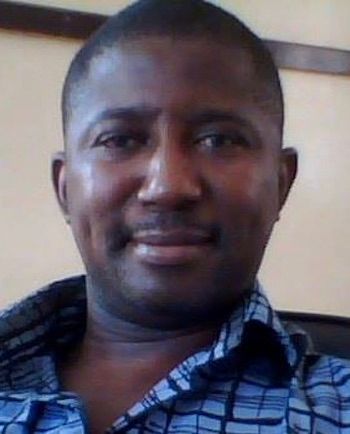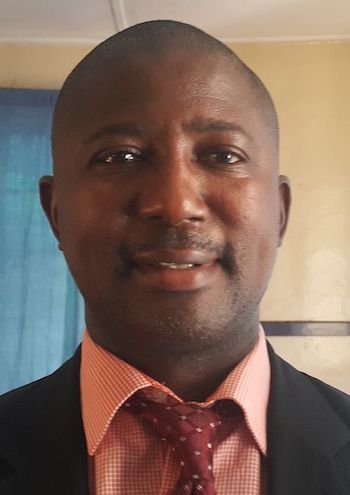Andrew Lavali

Update. December 2023
Andrew Lavali: Giraffe Hero Andrew Lavali continues to use his skills and platform as an activist to monitor governmental actions, inform the people of Sierra Leone about issues that require their attention and action—issues that border on their survival and well-being—and challenge policies and procedures that deny citizens their rights.
But not everybody is happy about the work that Lavali does year in and year out. People in both the political and private sectors continually smear his character and threaten his family as a way of discrediting and discouraging his efforts.
In December 2022, as part of his continuous efforts to fight for the democratic and economic freedoms of Sierra Leoneans, Lavali launched a report on issues of land management in Sierra Leone, citing various challenges to land acquisition and the effect on the livelihoods of residents during the process. The report—“The Freetown Disasters: Rethinking Sierra Leone’s Approach to Land Reform”—focuses on the Freetown land market, the political economy affecting land and housing reform, climate change, and natural disasters. As a result of this report, he was accused of being a stooge in the hands of the ruling government. In 2023, leading up to the national elections, Lavali came under serious attack from some writers within the local print media; they accused him of using phony surveys to curry favour from the central government.
Lavali believes in making a difference in society: “Unless bipartisan solutions are designed and implemented,” he says, “entrenched practices and vested interests in Freetown land and housing market will continue to hinder urban reform and make it difficult to mitigate disasters.”
Andrew Lavali continues to head the Institute for Governance Reform (IGR; igrsl.org); he has occupied the position of Executive Director since founding the organisation in 2012.

Andrew Thomas Lavali (original story)
Summary: Andrew Thomas Lavali worked for the government of Sierra Leone and eventually became frustrated at the lack of reforms he tried to implement. He founded his own organization, the Institute of Governance Reform (IGR), which monitors governmental actions and challenges policies and procedures that deny citizens their rights. Lavali has encountered much harassment for his efforts, but he and the IGR continue to expose corruption and advocate for positive change.
Profile:It was in 2009, while he was conducting economic research into World Bank contracts in Sierra Leone, that civil servant Andrew Lavali realized a principle that has guided his work ever since: “Anytime a politician is acting,” he says, “do not look at what he is given, but what he is gaining.”
Three years later, after futilely trying to institute reforms related to resource allocation, Lavali became ever more concerned about how cases in Sierra Leone’s courts are assigned, how judges are promoted, which chambers they come from, how that affects their decisions, and how to deliver justice in a more effective way. Therefore, Lavali left the government to form the Institute of Governance Reform—IGR—which seeks to promote electoral participation; free, fair, and peaceful elections; credible population and housing assessments; local council planning; improved economies; economic literacy; and human rights.
Almost immediately, Lavali was questioned by the Sierra Leone House of Parliament as to what exactly IGR would be doing. This questioning—which amounted to intimidation—continues to the present. As Lavali escalated his investigations into government misdoings, the government escalated its responses—harassing him, interrupting his meetings, and verbally assaulting him. Through it all, Lavali has continually stood up for his organization.
In 2015, IGR published its findings on Statistics Sierra Leone’s “Housing and Population Census.” It found that the census was in error about 40 percent of the time and that “anomalies were too glaring to ignore.” Background checks on the staff conducting the census revealed that Statistics Sierra Leone had given officials of the ruling party absolute control to manage data collection and census management.
In 2018, IGR produced a report, “Beyond the Noise”, showcasing the country’s inter-connectedness among citizens across Sierra Leone. That unity stood in sharp contrast to the conflicts that Lavali felt were spurred on by the government. The report charged that politicians were using tribes as a smoke screen to create divides across the country to enable looting. “It’s my job,” Lavali said of the report, “to let my country folks know the truth.”
In 2019 IGR produced another controversial report: “Bio-Meter”, a citizen’s scorecard on the state of implementation of 556 campaign promises made by President Julius Maada Bio during the run-up to the March 2018 elections. The “Bio-Meter One-Year Assessment Report” provided a detailed account of the status of the official declarations stated in the governing Sierra Leone People’s Party manifesto; the speech delivered by the President in his first State opening of parliament; and executive orders issued by the State House in the previous year.
Lavali expects more government pushback from IGR’s reports, but he remains determined to expose malfeasance where it exists and to change policies that deprive his fellow citizens of their rights.
“No amount of threats or intimidation,” he says, “could ever silence me from the work I have signed up for. I remain . . . convinced that the battle for electoral, governance, and economic reforms must be permanent and accepted characteristics of our democracy.”
